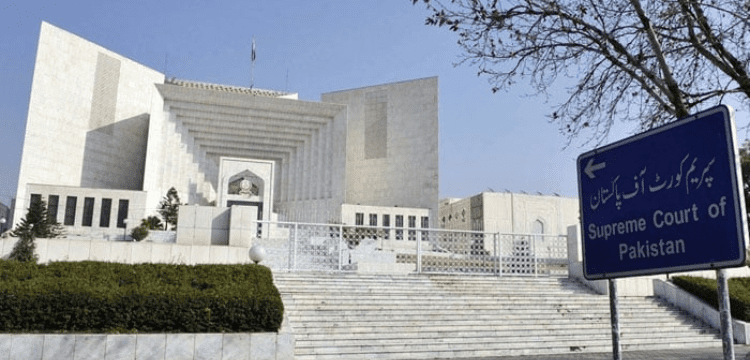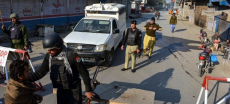[vc_row][vc_column][vc_column_text dp_text_size=”size-4″]ISLAMABAD: The Supreme Court of Pakistan (SC) issued a notice to all respondents on Monday, asking the Election Commission of Pakistan (ECP) about the legal and factual issues raised in Pakistan Tehreek-e-(PTI) Insaf’s petition regarding the delay in Punjab Assembly elections on Tuesday (tomorrow).
The hearing was presided over today by a five-member larger bench led by Chief Justice of Pakistan (CJP) Umar Ata Bandial and comprised of Justices Ijazul Ahsan, Munib Akhtar, Aminuddin Khan, and Jamal Khan Mandokhail.
During the hearing, CJP Bandial requested that all political parties pledge to hold free and fair elections, adding that “political parties should restore calm and peace.”
We cannot interpret the Constitution in a hoover,” the CJP stated.
Also Read: Supreme Court to hear PTI plea for election delay today.
Furthermore, Justice Bandial stated that the court “requires assurances that elections will be held in a transparent manner.”
The chief justice of the Supreme Court also stated that the electoral watchdog is a “just institution,” adding that “it may have gotten a little off track, but it can be brought back.”
Elections are important for democracy, according to CJP Bandial, but they must be held in a conducive environment.
Justice Bandial also questioned whether the ECP can overturn the president’s election date.
“Can it cancel the schedule instead of amending it?” the CJP inquired.
He also stated that “Article 254 of the Constitution cannot justify the wrongdoing referred to by ECP.”
The chief justice of the Supreme Court also stated, “There is a viewpoint that elections should be held in the country only when there is peace and order, elections should be free, transparent, and fearless.”
“What are our politicians doing to promote national stability?” “This is a very troubling situation,” said Justice Bandial.
Also Read: SCBA condemns ECP’s decision to postpone Punjab elections.
During the hearing, Justice Jamal Khan Mandokhail also spoke and raised concerns about the petition’s viability.
“Why did the petitioner not approach the high court for the implementation of the order?” Justice Mandokhail inquired.
He also inquired, “Where is the court’s order in suo motu case regarding announcement of election date?”
However, Justice Munib Akhtar said that “all five judges had signed the short order, which is order of the order”.
On March 25, the PTI petitioned the Supreme Court, claiming that the ECP’s decision to postpone the elections “violates both the Constitution and the apex court order.”
The Supreme Court registrar’s office assigned the PTI petition a number and scheduled a hearing without raising any objections.
According to the PTI petition, the party approached the Supreme Court because “the matter involved in the petition is of public importance with reference to the enforcement of fundamental rights of millions of Pakistanis, particularly the people of Punjab and Khyber Pakhtunkhwa (K-P).”
The move came after the electoral commission, in an unexpected move, postponed the election in Punjab until October 8 on the grounds that it could not hold transparent and peaceful polls on the scheduled date of April 30.
Also Read: ECP postpones Punjab elections to October 8
It stated that elections could not be held in Punjab due to the circumstances conveyed to it by law enforcement agencies, finance, defence, and interior ministries, as well as the Punjab chief secretary and others, all of whom were opposed to the polls on various grounds.
Following that, the ECP withdrew its notification regarding the Punjab elections, postponing voting for the provincial assembly until October 8, with the promise that a new election schedule would be announced in due course.
Earlier this month, the Supreme Court directed President Arif Alvi to announce the date of the Punjab Assembly election, while the governor of Khyber-Pakhtunkhwa (K-P) would set the date of the K-P assembly election in consultation with the ECP.
After hearing for two days, a five-judge larger bench of the Supreme Court issued a 3-2 split verdict on a suo motu case about the election dates for the two provincial assemblies on March 1.
On the orders of PTI Chairman Imran Khan, then-chief minister Chaudhry Parvez Elahi dissolved the Punjab Assembly in January. Imran also ordered the dissolution of the K-P Assembly, which was also dissolved the following month.
The PTI chief has been holding rallies and protests across the country in order to pressure the federal government into calling an early election. The dissolution of the Punjab and K-P assemblies was also part of his early election campaign.
The federal government has been staunchly opposed to early elections. It states that elections should be held on the same day after the incumbent government’s constitutional term ends.
The government contends that holding separate elections would exacerbate the political crisis. Both sides, however, acknowledge that the impasse has resulted in political insecurity and a worsening economic situation.[/vc_column_text][/vc_column][/vc_row]











